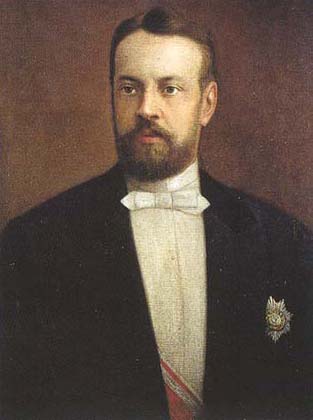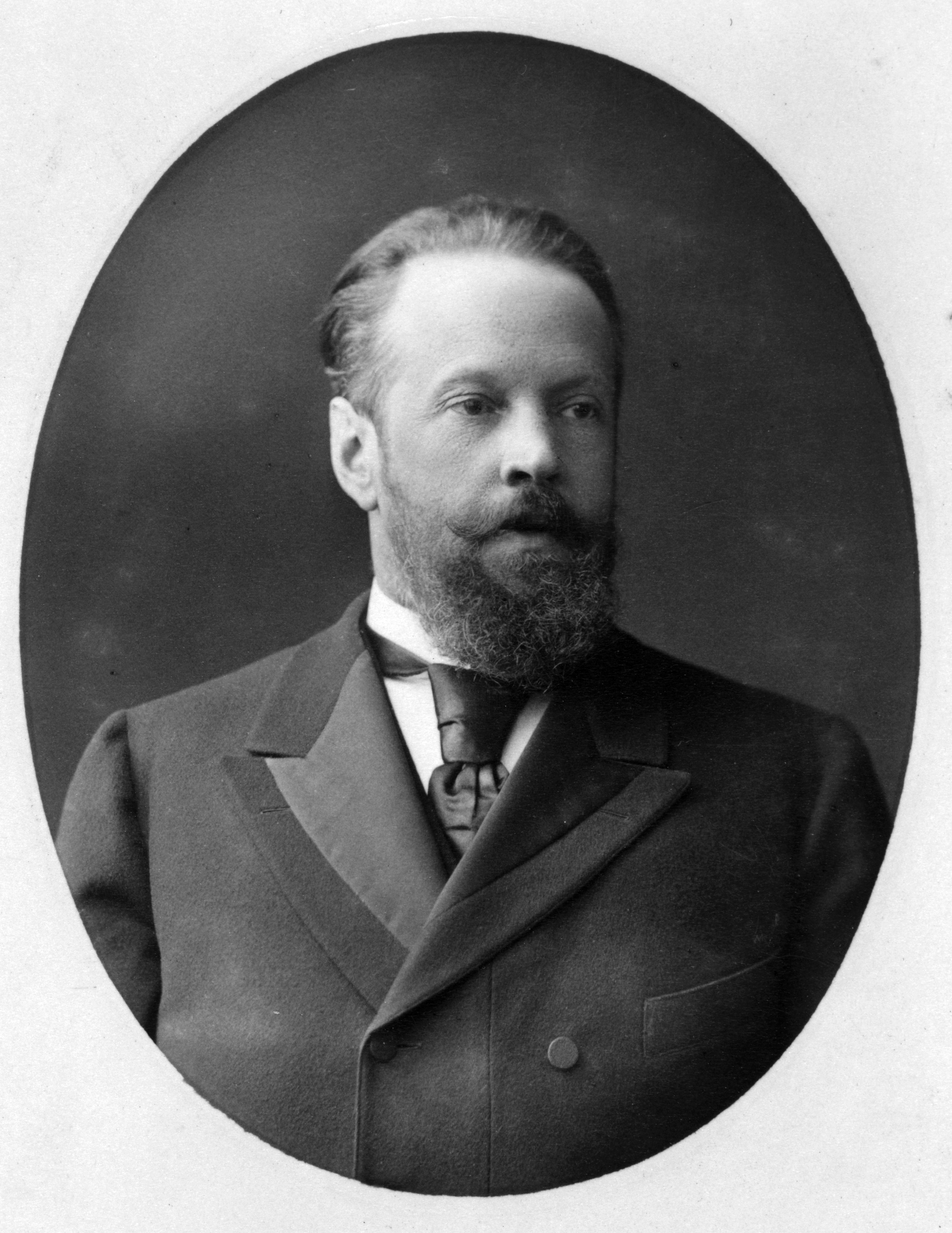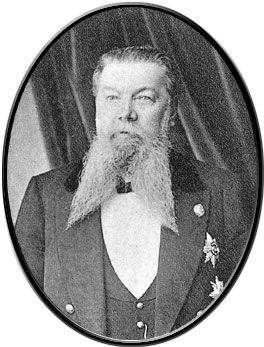|
Goremykin
Ivan Logginovich Goremykin (russian: Ива́н Лóггинович Горемы́кин, Iván Lógginovich Goremýkin) (8 November 183924 December 1917) was a Russian politician who served as the prime minister of the Russian Empire in 1906 and again from 1914 to 1916, during World War I. He was the last person to have the civil rank of Active Privy Councillor, 1st class. During his time in government, Goremykin pursued conservative policies. Biography Goremykin was born on 8 November 1839 into a noble family. In 1860 he completed studies at the Imperial School of Jurisprudence and became a lawyer in Saint Petersburg. In the Senate, Goremykin became responsible for agriculture in Congress Poland. In 1866 he was appointed as vice governor in Płock and in 1869 in Kielce. In 1891 he was appointed as deputy minister of justice, considered being an expert on the "peasant question". Within a year he moved to the Ministry of the Interior, becoming Minister from 1895-1899. A self ... [...More Info...] [...Related Items...] OR: [Wikipedia] [Google] [Baidu] |
Pyotr Stolypin
Pyotr Arkadyevich Stolypin ( rus, Пётр Арка́дьевич Столы́пин, p=pʲɵtr ɐrˈkadʲjɪvʲɪtɕ stɐˈlɨpʲɪn; – ) was a Russian politician and statesman. He served as the third prime minister and the interior minister of the Russian Empire from 1906 until his assassination in 1911. The greatest reformer of Russian society and economy; his reforms caused unprecedented growth of Russian state which was stopped by his assassination only. Born in Dresden, Germany, to a prominent Russian aristocratic family, Stolypin became involved in government from his early 20s. His successes in public service led to rapid promotions, culminating in his appointment as interior minister under prime minister Ivan Goremykin in April 1906. In July, Goremykin resigned and was succeeded as prime minister by Stolypin. As prime minister, Stolypin initiated major agrarian reforms, known as the Stolypin reform, that granted the right of private land ownership to the peasantry ... [...More Info...] [...Related Items...] OR: [Wikipedia] [Google] [Baidu] |
Boris Stürmer
Baron Boris Vladimirovich Shturmer (russian: Бори́с Влади́мирович Штю́рмер) (27 July 1848 – 9 September 1917) was a Russian lawyer, a Master of Ceremonies at the Russian Court, and a district governor. He became a member of the Russian Assembly and served as Prime Minister in 1916. A corrupt and incompetent Russian statesman, under his administration the country suffered drastic inflation and a transportation breakdown, which led to severe food shortages. Stürmer simply let matters drift until he was able to be relieved of this post. He was during the course of his career Minister of Internal Affairs and Foreign Minister of the Russian Empire. Biography Stürmer was born into a landowning family in Baykovo, Kesovogorsky District, Tver Governorate. His father Vladimir Vilgelmovich Stürmer was of German descent and a retired Captain of Cavalry in the Imperial Russian Army. His mother was Ermoniya Panina. A graduate of the Faculty of Law, Saint Pe ... [...More Info...] [...Related Items...] OR: [Wikipedia] [Google] [Baidu] |
Vladimir Kokovtsov
Count Vladimir Nikolayevich Kokovtsov (russian: Влади́мир Никола́евич Коко́вцов; – 29 January 1943) was a Russian politician who served as the Prime Minister of Russia from 1911 to 1914, during the reign of Emperor Nicholas II. Early life He was born in Borovichi, Borovichsky Uyezd, in the Novgorod Governorate on . Following graduation from the Imperial Alexander Lyceum in December 1872 Kokovtsov applied for admittance to Saint Petersburg State University to study law on the recommendation of Aleksandr Gradovsky, Nikolai Tagantsev and S. Pakhman, all notable legal authorities of the time. However, his father, who had promised to pay for his education suddenly died leaving the family in strained financial circumstances. As a result, instead of attending university he entered the civil service to provide him and his family an additional income. Civil service Kokovtsov was admitted as a candidate for a civil service position in the Imperial Minist ... [...More Info...] [...Related Items...] OR: [Wikipedia] [Google] [Baidu] |
Sergei Witte
Count Sergei Yulyevich Witte (; ), also known as Sergius Witte, was a Russian statesman who served as the first prime minister of the Russian Empire, replacing the tsar as head of the government. Neither a liberal nor a conservative, he attracted foreign capital to boost Russia's industrialization. Witte's strategy was to avoid the danger of wars. Witte served under the last two emperors of Russia, Alexander III () and Nicholas II ().Harcave, Sidney. (2004)''Count Sergei Witte and the Twilight of Imperial Russia: A Biography,'' p. xiii./ref> During the Russo-Turkish War (1877–78), he had risen to a position in which he controlled all the traffic passing to the front along the lines of the Odessa Railways. As finance minister from 1892 to 1903, Witte presided over extensive industrialization and achieved government monopoly control over an expanded system of railroad lines. Following months of civil unrest and outbreaks of violence in what became known as the 1905 Russian ... [...More Info...] [...Related Items...] OR: [Wikipedia] [Google] [Baidu] |
List Of Ministers Of Internal Affairs Of Russia
This is a list of Minister of Internal Affairs (Russia), Ministers of Internal Affairs of Russia. Russian Empire Provisional Government/Russian Republic Russian SFSR 1917–1930 1955–1966 1989–1992 Russian Federation See also * Ministry of Internal Affairs (Russia), Ministry of Internal Affairs * Russian Council of Ministers * Ministry of Police of Imperial Russia External links *Ministers of Imperial Russia {{Ministers of Internal Affairs (Russia) Interior ministers of Russia, *Lists Lists of government ministers of the Russian Empire, Interior Lists of government ministers of Russia Lists of government ministers of the Soviet Union ... [...More Info...] [...Related Items...] OR: [Wikipedia] [Google] [Baidu] |
Dmitry Sergeyevich Sipyagin
Dmitry Sergeyevich Sipyagin (russian: Дми́трий Серге́евич Сипя́гин) ( – ) was a Russian politician. Political career Born in Kiev, Sipyagin graduated from the Judicial Department of St Petersburg University in 1876. Served in the MVD as Vice Governor of Kharkov (1886–1888), Governor of Courland (1888–1891) and Governor of Moscow (1891–1893). Deputy of the Minister of State Property (1893); Deputy of the Minister of Interior (1894); Executive Director on the petitions of the Imperial Chancellery (1895–1899); Director of the Ministry of Interior (1899); Minister of Interior (1899). In 1899, during the Russian Student Strike, the government had given Sipyagin "the power of imposing military service as a punishment for acts of civil disobedience towards the University authorities, and themselves to appoint special committees, or rather Courts nominated ad hoc..." He remained the interior minister from 20 October 1899 to 2 April 1902. He was ... [...More Info...] [...Related Items...] OR: [Wikipedia] [Google] [Baidu] |
Nicholas II Of Russia
Nicholas II or Nikolai II Alexandrovich Romanov; spelled in pre-revolutionary script. ( 186817 July 1918), known in the Russian Orthodox Church as Saint Nicholas the Passion-Bearer,. was the last Emperor of Russia, King of Congress Poland and Grand Duke of Finland, ruling from 1 November 1894 until his abdication on 15 March 1917. During his reign, Nicholas gave support to the economic and political reforms promoted by his prime ministers, Sergei Witte and Pyotr Stolypin. He advocated modernization based on foreign loans and close ties with France, but resisted giving the new parliament (the Duma) major roles. Ultimately, progress was undermined by Nicholas's commitment to autocratic rule, strong aristocratic opposition and defeats sustained by the Russian military in the Russo-Japanese War and World War I. By March 1917, public support for Nicholas had collapsed and he was forced to abdicate the throne, thereby ending the Romanov dynasty's 304-year rule of Russia (16 ... [...More Info...] [...Related Items...] OR: [Wikipedia] [Google] [Baidu] |
Prime Minister Of Russia
The chairman of the government of the Russian Federation, also informally known as the prime minister, is the nominal head of government of Russia. Although the post dates back to 1905, its current form was established on 12 December 1993 following the introduction of a new constitution. Due to the central role of the president of Russia in the political system, the activities of the executive branch (including the prime minister) are significantly influenced by the head of state (for example, it is the president who appoints and dismisses the prime minister and other members of the government; the president may chair the meetings of the cabinet and give obligatory orders to the prime minister and other members of the government; the president may also revoke any act of the government). The use of the term ''prime minister'' is strictly informal and is never used in the constitution. Mikhail Mishustin is the current prime minister. He was appointed on 16 January 2020 after ... [...More Info...] [...Related Items...] OR: [Wikipedia] [Google] [Baidu] |
Active Privy Councillor, 1st Class
Active Privy Councillor, 1st class (russian: действительный тайный советник первого класса, deystvitelnyi taynyi sovetnik pervogo klassa) was the civil position (class) in the Russian Empire, according to the Table of Ranks introduced by Peter the Great in 1722. That was a civil rank of the 1st class and equal to those of Chancellor, General Field Marshal in the Army, and General Admiral in the Navy. The rank holder should be addressed as '' Your High Excellency'' (russian: Ваше Высокопревосходительство, Vashe Vysokoprevoskhoditelstvo). Overview The rank was granted to those persons who, by virtue of their official positions, could not be called Chancellors. During the existence of the Russian Empire, only 13 people received that rank; two of whom later became Chancellors. Almost all of them were representatives of Russian noble families: the Panins, Golitsyns, Lopukhins, Stroganoffs, Kurakins, Razumovskys. In con ... [...More Info...] [...Related Items...] OR: [Wikipedia] [Google] [Baidu] |
Ivan Durnovo
Ivan Nikolayevich Durnovo (russian: Иван Николаевич Дурново, the patronymic is also transcribed as Nikolaevich; – ) was a Russian political figure. He served as Chairman of the Committee of Ministers between 1895 and 1903, the precursor to the post of prime minister. Biography Ivan Nikolaevich Durnovo was born on 1 (13) March 1834 in Chernigov Governorate (which was located mostly within northeastern Ukraine and Russia's Bryansk Oblast) to the noble Durnovo family. He attended Prince Michael Artillery Academy (russian: Михайловская артиллерийская академия) in Saint Petersburg. After a brief time in the military, he returned to civilian life and was elected by the nobility of his uyezd (district) to the position of the Marshal of Nobility. Later he occupied a similar position for the entire Chernigov Governorate. He served as the Governor of Chernigov Governorate (1863–1870) and Yekaterinoslav Governorate (1870� ... [...More Info...] [...Related Items...] OR: [Wikipedia] [Google] [Baidu] |
Novgorod Governorate
Novgorod Governorate (Pre-reformed rus, Новгоро́дская губе́рнія, r=Novgorodskaya guberniya, p=ˈnofɡərətskəjə ɡʊˈbʲernʲɪjə, t=Government of Novgorod), was an administrative division (a '' guberniya'') of the Russian Empire and the Russian SFSR, which existed from 1727 to 1776 and from 1796 to 1927. Its administrative center was in the city of Novgorod. The governorate was located in the northwest of the European part of the Russian Empire. History The governorate was established in 1727 from Belozersk, Novgorod, Pskov, Tver and Velikiye Luki Provinces of St. Petersburg Governorate. It was abolished by a decree (''ukase'') of Catherine II on , 1776, which established Novgorod and Tver Viceroyalties instead. Novgorod Viceroyalty included Novgorod and Olonets Oblast, whereas Tver Viceroyalty was made of the former Tver Province. The viceroyalty was never formally abolished, however, after a number of administrative transformations it was ... [...More Info...] [...Related Items...] OR: [Wikipedia] [Google] [Baidu] |
Tsar
Tsar ( or ), also spelled ''czar'', ''tzar'', or ''csar'', is a title used by East Slavs, East and South Slavs, South Slavic monarchs. The term is derived from the Latin word ''Caesar (title), caesar'', which was intended to mean "emperor" in the European medieval sense of the term—a ruler with the same rank as a Roman emperor, holding it by the approval of another emperor or a supreme ecclesiastical official (the Pope or the Ecumenical Patriarch)—but was usually considered by western Europeans to be equivalent to "king". It lends its name to a system of government, tsarist autocracy or tsarism. "Tsar" and its variants were the official titles of the following states: * Bulgarian Empire (First Bulgarian Empire in 681–1018, Second Bulgarian Empire in 1185–1396), and also used in Kingdom of Bulgaria, Tsardom of Bulgaria, in 1908–1946 * Serbian Empire, in 1346–1371 * Tsardom of Russia, in 1547–1721 (replaced in 1721 by ''imperator'' in Russian Empire, but still re ... [...More Info...] [...Related Items...] OR: [Wikipedia] [Google] [Baidu] |

_by_shakko_01.jpg)







